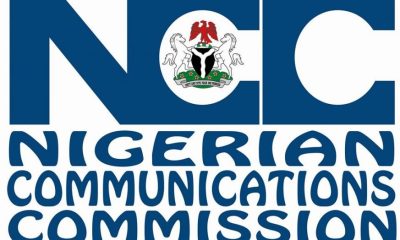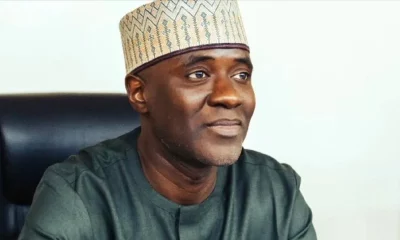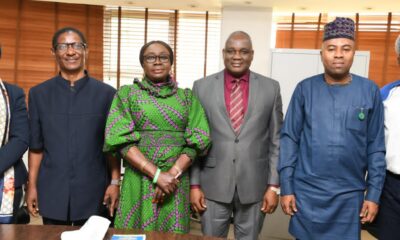Business
COVID-19: NCC tasks telecoms on quality service delivery

The Nigerian Communications Commission, NCC, has charged telecommunication companies with the provision of better Quality of Service (QoS) delivery as Nigerians strive to adapt to the new normal created by Covid-19 pandemic.
Executive Vice Chairman, NCC, Prof. Umar Garba Danbatta, gave the charge at the first edition of the Virtual Telecom Consumer Parliament (V-TCP) hosted by the Commission in Abuja on Friday, with the theme: “Impact of Covid-19 on Telecoms Service Delivery.”
Speaking on the theme of the parliament, Danbatta cited the recent report by the International Telecommunications Union (ITU) in June, which stated that, ” With the pandemic, some telecom operators and platforms are reporting demand spike, especially in data usage and volume of calls, as high as 800 per cent since the outbreak of the pandemic.”
Danbatta noted that the spike should not bring about lag in the quality or capacity of service delivery by mobile network operator, but they should rather play their roles in sustaining quality of service delivery and quality of experience by the consumers, who are critical stakeholders in the telecoms sector.
The EVC listed some critical regulatory actions that have been taken by the Commission to mitigate the impact of the COVID-19 pandemic on quality of service (QoS) delivery by the networks to telecom consumers to include , developing of e-platform by the NCC in conjunction with the supervising Ministry to handle all requests from the licensees to ensure that regulatory services are provided to sustain service delivery to subscribers.
The approval and encouraging resource sharing among network operators and secured Right of Passage (RoP) for all telecommunications companies and suppliers for easy movement during the lockdown. These measures the EVC said, enabled the operators to service their base stations and ensured seamless services for telecom consumers who increasingly relied on the networks during the pandemic.
Danbatta further stated that the NCC, working with the ministry is resolving the problem of high cost of Right of Way (RoW) with the Nigerian Governors Forum (NGF), adding that, through such engagements, the state governors have lent their support for a robust broadband infrastructure.
“The Commission is hopeful that with the reduction in RoW, which will automatically result in reduction in capital expenditure (CAPEX) by the network operators, telecom companies will sooner than later reciprocate the gesture by making their services more affordable to Nigerians,” he said.
Danbatta noted that regulatory efforts have also resulted in a Presidential approval directing Security Agencies to protect Information and Communication Technology (ICT) and telecom facilities as critical national assets. He said this has helped to safeguard telecom infrastructure for the greater role telecom has to play with the outbreak of Covid-19 pandemic.
He advised the service providers to inculcate the habit of constant upgrade and expansion of their network capacity in order to always deliver top-notch QoS to their consumers.
Similarly, the Director, Consumer Affairs Bureau, NCC, Mr Efosa Idahen in his welcome address noted that the regulatory agency chose theme: “The Impact of Covid-19 pandemic on Telecom Service Delivery” for discussion in order to ascertain the role telecom service providers played and are expected to play to protect telecoms consumers and deliver quality service to them during this unique period.
According to Idehen, with the theme in mind, it becomes necessary to ask: “What roles are currently being played by telecom service providers and Internet Service Providers (ISPs) alike towards protecting their consumers in the Covid-19 pandemic era.
“Additionally, are the measures put in place to protect the consumers sufficient?
” Do the service providers need to institute new measures to improve upon consumer protection initiatives? Finally, do the additional measures compliment the current legal and regulatory frameworks to ensure improved security for telecom consumers while online?
With the hope of preferring solutions to the questions the theme posed after deliberations.
The Executive Commissioner, Stakeholder Management, Barrister Adeleke Adewolu, earlier in his presentation showed the various Quality of Service (QoS) indicators for the second quarter of the year across the networks and how the consumer Quality of Experience compared with the parameters based on the voice of the consumer survey (VoxPop) conducted by the Commission.
Speaking further, the ECSM highlighted the challenges facing operators, which impact negatively on quality of service to include fibre cuts, vandalism and theft of telecommunications site equipment.
A panel session of telecoms operators, who participated virtually in the TCP, was held and moderated by the Director, Consumer Affairs, NCC, Mr. Efosa Idehen.
The panel session addressed issues of network capacity upgrade, change in consumer data consumption behavior, implementation of agreed Consumer Complaints and Service Level Agreement (CC/SLA), consumer education as well as general issues around quality of service and quality of experience by the over 192 million telecom consumers in the country.
Contact: info@royalnews.com.ng

















